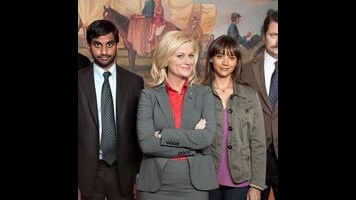Parks And Recreation: "Pilot"

Parks And Recreation began its existence as a proposed, if vaguely conceptualized, spin-off of The Office. What’s made it to the screen has no direct connection to The Office, apart from sharing the creative team of Greg Daniels and Michael Schur. But it clearly shares a lot of DNA with its sister show. A pseudo-documentary in The Office mode, it trades Scranton for the fictional Pawnee, Indiana and a paper company for the halls of small-city government. In place of Steve Carell’s Michael Scott we have Amy Poehler’s Leslie Knope, another dreamer who experiences the real world through a highly selective filter. It’s like the same species that mutated differently in a different environment.
Which isn’t to say it shouldn't thrive. For all its similarities, Parks And Recreation has a number of key differences as well, starting with Poehler’s protagonist. Where Michael continually tries to bend the world into the wonderful place promised to him by movies, television, and childhood fantasies, Poehler plays Leslie as a woman who believes everything civics class taught her about the nobility of American democracy. She proceeds through life accordingly despite evidence of bureaucratic sloth and corruption all around her. Michael generally means well and doesn’t necessarily want ill to come to others, but he wants good to come to himself above all. He treats Dunder-Mifflin as a family, but it’s primarily because he needs the comfort that way of thinking provides. Leslie talks early on about her desire to be the first female president, but she genuinely seems to want to make the world a better place, one small corner at a time. She means well. Of course, so did Don Quixote.
Parks And Recreation gives Leslie a windmill immediately in the form of Lot 48, a patch of land dug out for an abandoned condo development. It’s brought to her attention by Ann Perkins (Rashida Jones), a nurse whose musician boyfriend (Chris Pratt) broke both legs falling into the pit. (That he was cutting through it in a presumably drunken attempt to find a shortcut home only becomes obvious later.) Spurred to do something about it by Ann’s earnest plea, Leslie sets out to turn the lot into a park.
As a few commenters have already pointed out elsewhere on the site, this is essentially the plot to Akira Kurosawa’s 1952 masterpiece Ikiru reworked as a sitcom. In Ikiru, the great Takashi Shimura plays a go-nowhere bureaucrat who learns he’s dying. Trying to find some meaning in life before it slips away, Shimura throws himself into debauchery and despair then rallies in the face of death to turn a mosquito-infested corner of Tokyo into a playground. While I’m pretty sure that P&R’s Leslie isn’t dying, I think other comparisons are valid. She takes it as her duty to the world to spur change by fixing one small problem. True, she keeps one eye on advancing her career as she does it, suggesting it could be her “Hoover Dam.” But if her motives aren’t entirely altruistic, she’s the closest the show has to an idealist.
 Keep scrolling for more great stories.
Keep scrolling for more great stories.
